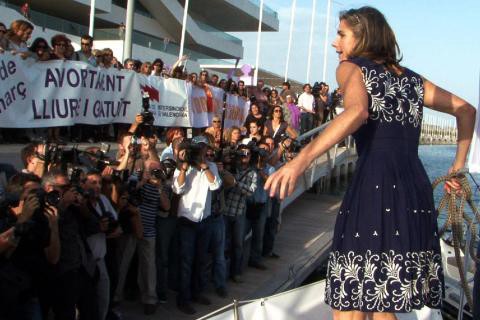Dutch physician Rebecca Gomperts made waves in 1999 when she announced that she would provide abortions on international waters to women living in countries like Ireland and Poland. When her organization Women on Waves first set sail, she faced overwhelming opposition from political and religious leaders. But in the past fifteen years, Women on Waves has created a burgeoning network of international abortion activists and become one of the most unique feminist organizations in the world.
In her feature debut Vessel, documentarian Diana Whitten profiles Gomperts and her allies.
Vessel will debut at SXSW on March 9.
Please give us your description of the
film.
Vessel is about Dr.
Rebecca Gomperts, who sails a ship around the world, providing abortions at sea
for women with no legal alternative. Her idea begins as flawed spectacle, faced
with governmental, religious, and military blockade. But with each roadblock
comes a more refined mission, until Rebecca realizes she can use new
technologies to bypass law — and train women to give themselves abortions with pills using
WHO-researched protocols. From there, we witness her create an
underground network of emboldened, informed activists who trust women to handle
abortion themselves. Vessel is Rebecca’s story: one of a
woman who hears and answers a calling, and transforms a wildly improbable idea
into a global movement.
What drew you to this story?
Initially, I was drawn to the metaphor inherent
to the story — that a woman had to leave one realm of sovereignty to reclaim
her own. I thought it was a rare and interesting example of the offshore being
used not for crime or personal gain, but for social justice. And I thought
Rebecca would be inspiring on film. Over the years, my inspiration has evolved.
It was impossible to witness these activists working with women and not
internalize how desperately alone women and providers feel in settings where
abortion is inaccessible. The Women on Waves campaigns make them feel
connected and less scared. One of Vessel’s goals is to offer
that same solidarity.
What was the biggest challenge in making
the film?
Laws never control if abortions happen or not; they only can control whether or not they happen safely. Abortion with pills is
considered revolutionary, as it offers a safe, accessible alternative to end
unwanted pregnancies where women can get the pills but not adequate healthcare.
Rebecca’s is one of few organizations that publicly educates women about
these pills, regardless of restrictive law.
When we first started the film, the abortion
pill was still relatively unfamiliar in the US, and the idea of self-induction
was foreign. We had the challenge of educating potential allies and funders
about the pills, and about how women rely on them in restricted countries. Many
thought the concept was too risky.
Now, there is a growing global understanding
that in restricted environments, the pills — when used correctly — are a
viable, safe alternative. Moreover, due to an onslaught of restrictive laws in
the US, many women here are faced with the same restricted options as the women
visited by Rebecca’s ship. It would be a different landscape were we starting
this project now.
What advice do you have for other female
directors?
I suppose similar to the advice I’d have for
any director: pick a story you absolutely love.
What’s the biggest misconception about you
and your work?
At this stage, there is a misconception among
my non-filmmaker friends that once the film is finished, the process is over. It’s
not commonly understood how much promotion and engagement is now part of the
filmmaker’s job. I’m excited about the engagement strategies we are planning, and the job is far from finished!
In terms of the activist side of things, I was
not prepared for how empowering this work can be. We tend to have assumptions
about abortion, and while it often can be a profound and sad experience for
women, it is actually very common. The most consistent emotion I’ve seen
from women seeking help is relief and gratitude. The activists in the Women on
Waves network keep an unapologetic and unsentimental focus on the woman’s
needs, and over the years that has revealed my own misconceptions about
abortion itself.
Do you have any thoughts on what are the
biggest challenges and/or opportunities for the future with the changing
distribution mechanisms for films?
This is my first film, so I’m about to embark
on distribution for the first time. I’m learning a lot about hybrid strategies,
and it seems there is a lot of room for creativity right now as the model
reinvents itself.







